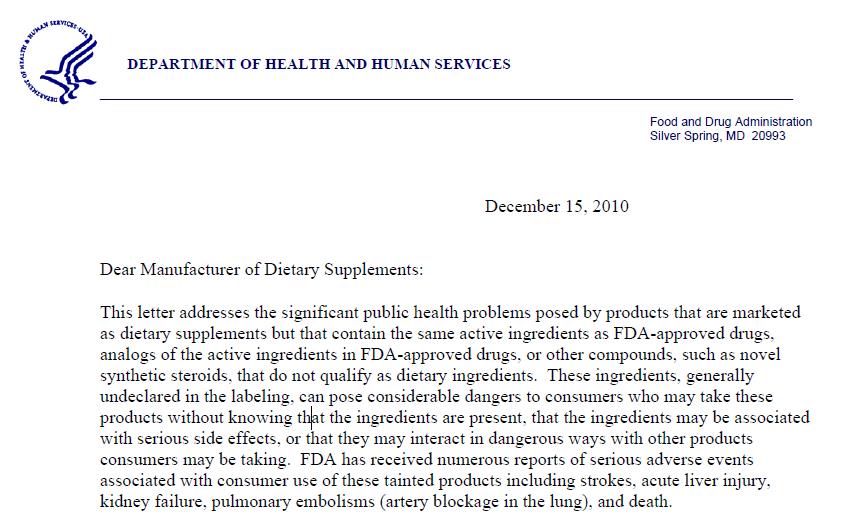In December 2010, the FDA sent a mass mailing to dietary supplement manufacturers to address the “significant public health problems” posed by dietary supplements with unlisted and/or unapproved ingredients. The FDA had received numerous reports of serious adverse events associated with dietary supplements, especially those promising results with weight loss, muscle building, and sexual performance. These illegal drug ingredients can cause dangerous side effects, including, but not limited to you to contact us for a free case evaluation at www.andrewsthornton.com or 1-800-664-1734.
- Renal (kidney) failure
- Acute liver injury
- Pulmonary embolism (artery blockage in the lung)
- Allergic reactions to unlisted ingredients
- Adverse interactions with other drugs
- Stroke
- Death
In previous posts, Andrews & Thornton has discussed the dangerous side effects and contamination of dietary supplements containing ingredients like aegeline, sildenafil, sibutramine, and DMAA. As of December 2010, the FDA worked to recall numerous dietary supplements with potentially harmful ingredients:
- More than 70 products marketed for sexual enhancement
- More than 40 products marketed for weight loss
- More than 80 products marketed for body building
Unfortunately, the marketing and sale of dangerous dietary supplements continues at an alarming rate. Most recently, FDA laboratory tests revealed multiple unlisted ingredients in more than 70 over-the-counter (OTC) weight loss drugs.
When potentially dangerous (and even fatal) drug ingredients are unlisted, consumers cannot make an informed decision about the safety of the products. Additionally, while dietary supplements are not regulated by the FDA, drugs containing these ingredients must meet FDA approval before they are marketed. These fraudulent practices therefore undermine consumer confidence in dietary supplements as a whole.
The FDA’s letter also served as a reminder to dietary supplement manufacturers that fraudulent practices could lead to federal investigation, seizure and destruction of illegal products, and criminal and civil prosecution. The FDA told manufacturers not to expect a warning before these sanctions and enforcement actions took place.
Everyone in the supply chain of command is responsible for ensuring that their products are in compliance with FDA standards. Distributors, importers, manufacturers, and sellers of dietary supplements have the responsibility of ensuring the quality of ingredients used. Additionally, manufacturers and distributors must comply with Current Good Manufacturing Practices (cGMPs) so that consumers can correctly expect that their drugs—both prescription and OTC—are safe and effective.
Although producers of dietary supplements have long been aware of their obligations under FDA regulations, tainted dietary supplements containing unlisted ingredients continue to be widespread. If you or a loved one has suffered a serious injury from a dietary supplement, we encourage you to contact us for a free case evaluation at www.andrewsthornton.com or 1-800-664-1734.








